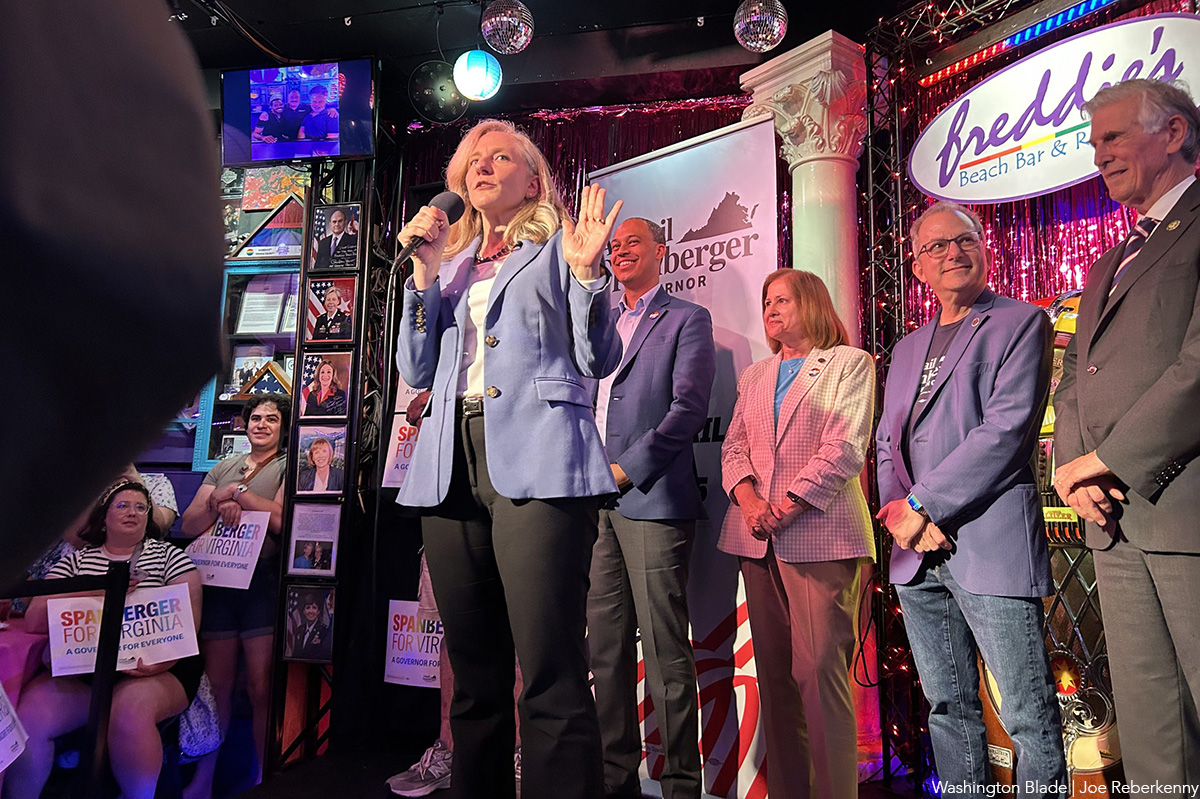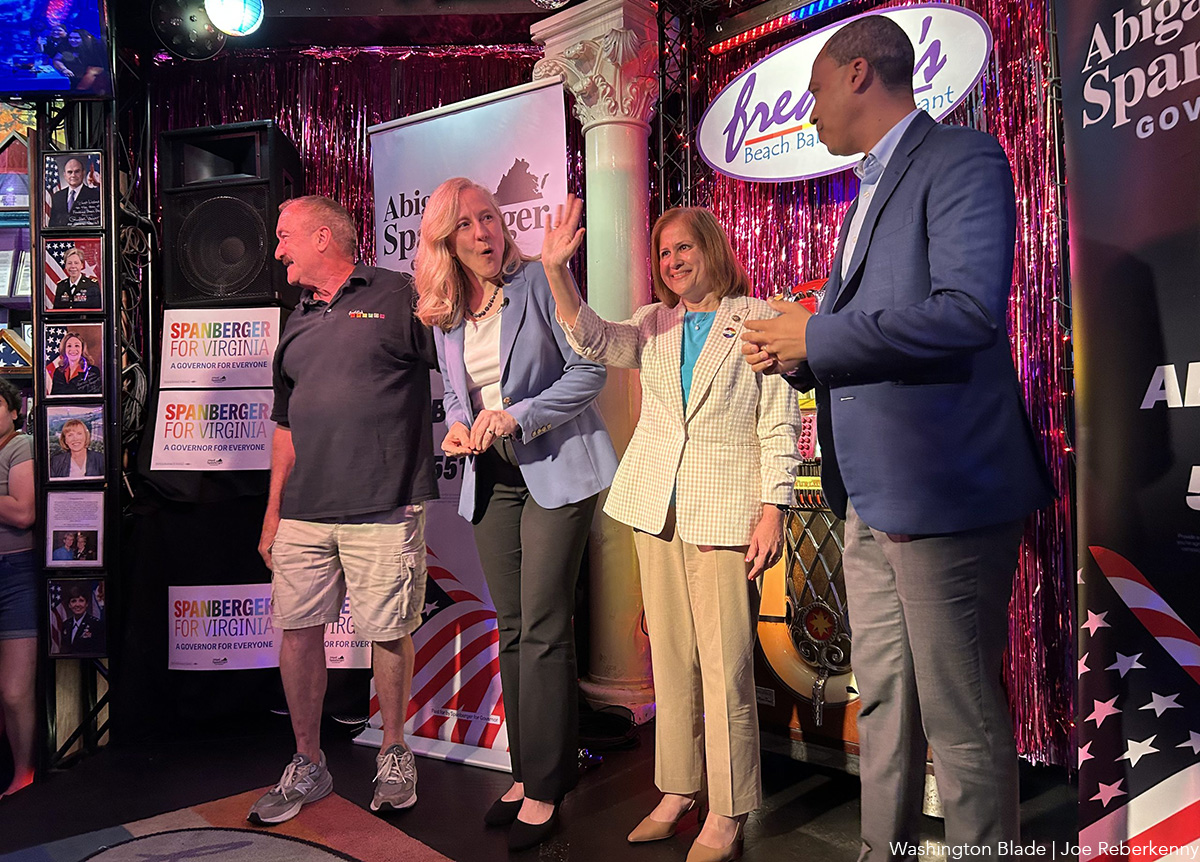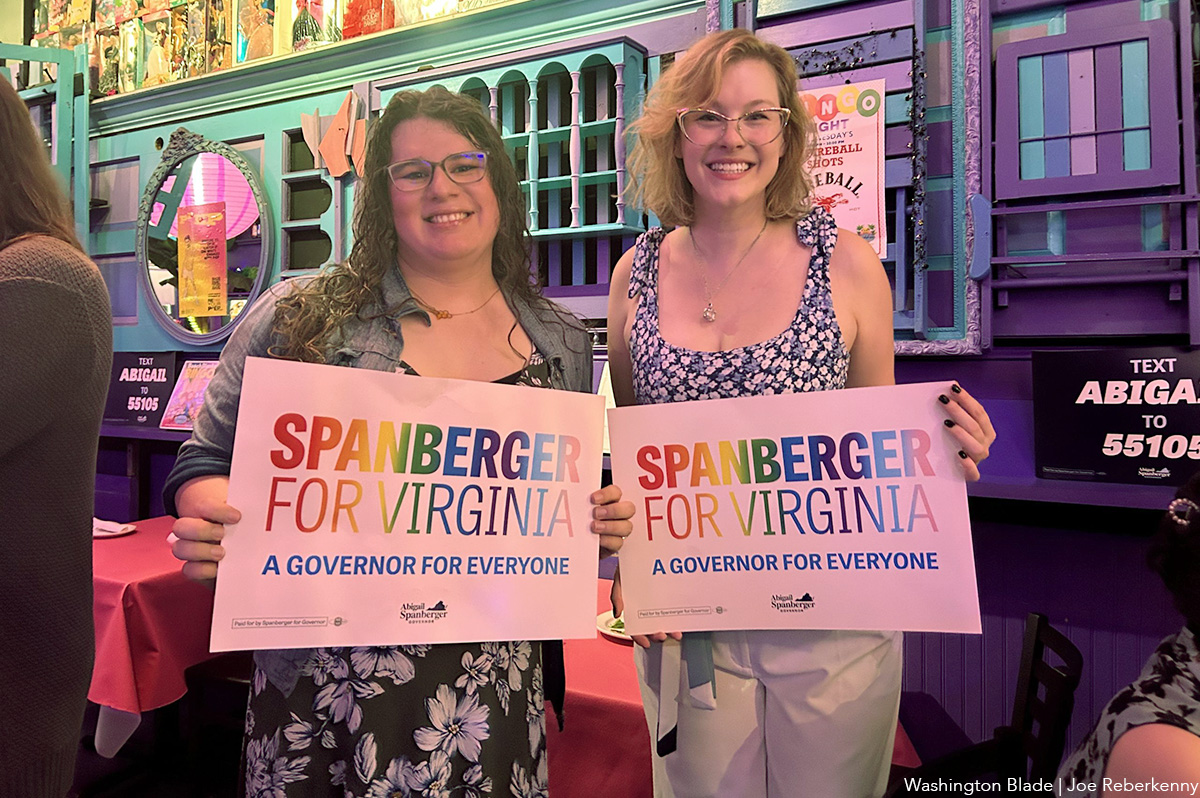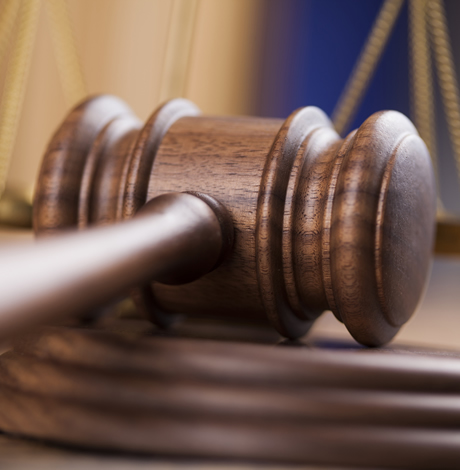Local
Man charged in Tony Hunter death back in jail
Robert Hannah arrested for alleged assault, drug possession

D.C. resident Robert Hannah, 20, who served six months in jail in connection with the Hunter case, was being held in jail this week for an arrest last month for allegedly assaulting his girlfriend.
The United States Attorney’s office asked a D.C. Superior Court judge to hold Hannah in custody on a misdemeanor assault charge, which it listed as an incident of domestic violence, following Hannah’s arrest earlier this year on a separate charge of possession of marijuana.
Hannah was scheduled to appear in court on Thursday for a status hearing. A judge was expected to decide whether he should continue to be held or be released while awaiting trial on the assault charge.
His latest arrests drew the attention of LGBT activists, who expressed outrage in July 2009 when a grand jury lowered the charge against Hannah from manslaughter to misdemeanor simple assault for his role in Hunter’s death.
Prosecutors with the U.S. Attorney’s office said they could not support a manslaughter charge, let alone a first or second-degree murder charge against Hannah, because the evidence in the case didn’t support those charges.
Police and prosecutors stated in court papers that Hannah punched Hunter in the face as the two crossed paths on the street. They said the “altercation” occurred while Hunter and a friend were walking from their car to BeBar, a gay bar on 9th Street, N.W. near the D.C. Convention Center that has since closed.
According to court records, Hannah told police at the time he was arrested in the case that he punched Hunter in self-defense after Hunter touched his crotch and buttocks in a sexually suggestive way. A witness on the scene backed up Hannah’s claim of being groped, the police report said.
However, a friend of Hunter, who said he was walking with Hunter at the time of the assault, said Hunter never touched Hannah and that Hannah and two or three other men assaulted him and Hunter in an unprovoked attack.
For nearly a year, LGBT activists criticized police and prosecutors for appearing to accept Hannah’s version of what happened. They said Hannah appeared to be invoking the so-called “gay panic” defense, in which criminals who attack gay men claim to have been sexually propositioned as an alibi.
Hannah, then 18, accepted an offer by the U.S. Attorney’s office to plead guilty to the simple assault charge. A judge later sentenced him to the maximum penalty of six months in jail for that charge.
Shortly before the sentencing, the U.S. Attorney’s office released a 14-page sentencing memorandum explaining its decision against pursuing charges of murder or manslaughter against Hannah. Among other things, the document noted that an autopsy found that Hunter was intoxicated at the time of the assault. It said the D.C. medical examiner found that a facial injury that Hunter received from being punched by Hannah was superficial and did not seriously injure him.
According to the police and medical examiner’s report, Hunter fell against a fence after being punched and stood up on his own before losing his balance and falling backwards to the ground, hitting his head on the pavement. The force of his head hitting the pavement caused a fatal brain injury that led to his death, the medical examiner concluded.
Assistant U.S. Attorney Kevin Flynn, who prosecuted the case against Hannah, told a November 2009 community meeting organized by the local group Gays and Lesbians Opposing Violence (GLOV) that the medical examiner’s report would have been used by the defense in a trial. Flynn said a jury would almost certainly have found Hannah not guilty of murder or manslaughter based on that evidence, especially the medical examiner’s assertion that Hunter’s intoxication from alcohol contributed to a loss of balance that led to his fall to the pavement.
Flynn stated in the sentencing memorandum that Hunter’s friend, who claimed the attack by Hannah was unprovoked, gave a series of conflicting statements to police that raised serious questions about his reliability as a witness had the case gone to trial.
GLOV official Christopher Farris disputes Flynn’s claim that the friend was unreliable, saying conflicting statements about a traumatic event that led to Hunter’s death shouldn’t be dismissed and could have been helpful at a trial. Farris questioned the U.S. Attorney’s office and D.C. police for failing to more aggressively pursue leads to determine whether Hannah and others who were with him targeted Hunter as a gay man.
Residents in nearby neighborhoods knew gays were arriving and leaving the area to patronize BeBar, which was well known as a gay club, Farris and other activists said.
Shaw neighborhood activist Ricky Williams, who alerted activists and the media about Hannah’s latest arrests through a series of e-mails, called on the U.S. Attorney’s office to vigorously prosecute Hannah in the current two cases.
“There is no reason why a man thrice charged with violent crimes should be able to walk the streets of my neighborhood as if nothing ever happened,” he said in one e-mail. “How many more people must suffer before anyone does anything about Mr. Hannah?”
Assistant U.S. Attorney Roger Kemp, who is prosecuting Hannah in the current two cases, called on community members to submit to the court community impact statements at the appropriate time to explain how Hannah may have had a negative impact on the community.
William Miller, a spokesperson for the U.S. Attorney’s office, said community impact statements are submitted only if and when a defendant is convicted of a crime and is about to be sentenced by a judge.
“If he is convicted, the statements would be helpful in advance of sentencing, giving the U.S. Attorney’s Office and the court additional information that could be useful,” Miller told the Blade. “Of course, all defendants are presumed innocent until, and unless, proven guilty.”
Maryland
Silver Spring holds annual Pride In The Plaza
‘Today means inclusion. It means to build resilience’

Silver Spring’s annual Pride in the Plaza event took place on Sunday to celebrate the LGBTQ community and emphasize inclusion and resilience.
“Today means inclusion. It means to build resilience, love,” Robyn Woods, program and outreach director for Live In Your Truth, which organized the event, said. “I mean, just being surrounded by the community and so many great entrepreneurs, business owners, and just being a part of this whole rainbow coalition that we call the LGBTQIA to be about.”
With the event being her first time organizing for Live In Your Truth, Woods said she felt emotional to see the support and love at the event.
“Some people (are) bringing out their children, their babies, their grandparents,” Woods said. “It’s a lot more allies here than anything else. That type of support to me means so much more than just support from my community; just outside support, inside support, so much support around it, so much love. Everyone’s smiling outside, helping each other.”
Attendees of the event were able to head over to the Family Fun Zone, an air-conditioned Pride Cool Down Lounge, or watch live drag performances in the main stage area.
Along with entertainment and a shaved-ice stand, rows of information tables stood along the plaza, including FreeState Justice, the Washington Spirit, Trans Maryland, Moco Pride Center, and the Heartwood Program, an organization that offers support, therapy, education, and resources to the LGBTQ community.
“I want people to know about our services, and I love what we have to offer,” Jessica Simon, psychotherapist for Heartwood Program’s Gender Wellness Clinic, said. “I (also) want to be part of a celebration with the community, and so it feels good to be here with other people who have something they want to give to the community.”
She added that within today’s political climate, to which she called an “antidote to shame,” it’s important to be celebrating Pride.
“There’s a lot of demonization of LGBTQI people,” Siena Iacuvazzi, facilitator for Maryland Trans Unity, said. “(Pride) is part of the healing process.”
Iacuvazzi said she was taught to be ashamed of who she was growing up, but being a part of a community helped her flourish in the future.
“I was taught how to hate myself. I was taught that I was an abomination to God,” she said. “But being a community is like understanding that there are people who have experienced the same thing, and they’re flourishing. They’re flourishing because they’re willing to stand up for themselves as human beings and discover themselves and understand what’s true for themselves.”
She added that Pride allows for a mutual understanding to take place.
“It’s more of a sense of belonging … and just taking that home and understanding you’re not alone,” Iacuvazzi said. “We’re each taking our own journey — we’re not putting that on each other. It’s just walking away with a sense of belonging and humanity.”
Similar to Iacuvazzi, Woods said she hopes attendees’ biggest takeaways would be family, fun, resilience, and pride.
“Being proud of yourself, being happy for who you are, and representation and how much it matters,” she continued. “And I think all these young people that are walking around here get to see versions of themselves, but older. They get to see so many different lesbian, gay, bisexual, pansexual people that are successful, that are showing love, that care, and it’s not how we’re portrayed in the media. It’s lovely to see it out here. (It’s) like we’re one big old, happy family.”
Virginia
Spanberger touts equality, reproductive rights in Arlington
Democratic Va. gubernatorial nominee made campaign stop at Freddie’s Beach Bar

With the general election heating up and LGBTQ rights under increasing threat nationwide, Virginia gubernatorial candidate Abigail Spanberger brought her “Span Virginia Bus Tour” to Arlington’s Freddie’s Beach Bar for a campaign stop filled with cheers, policy pledges, and community spirit.
Spanberger, who served three terms in the U.S. House of Representatives from 2019 through early 2025 for Virginia’s 7th Congressional District, also served as a federal law enforcement officer specializing in narcotics and money laundering cases, and as a CIA case officer working on counterterrorism and nuclear counterproliferation.
Spanberger is running against Republican nominee Winsome Earle-Sears, the current lieutenant governor of Virginia, who said she was “morally opposed” to a bill protecting marriage equality in the commonwealth.
She was joined by other Democratic candidates and supporters: lieutenant gubernatorial candidate Ghazala Hashmi, attorney general candidate Jay Jones, Virginia state Sen. Adam Ebbin (D-Alexandria), and Congressman Don Beyer.

Freddie’s was packed wall-to-wall with supporters, many of whom wore “Spanberger for Virginia” shirts in the progressive Pride flag colors. In her speech, she made it clear that LGBTQ Virginians’ rights are on the ballot this year.
“I’m so excited to be here, and I am so grateful to the entire staff of Freddy’s for letting us overtake this incredible venue that is not just an awesome place to come together in community, but is a symbol to so many people of joy, of happiness, of community and of celebrating our friends and our neighbors,” Spanberger told the packed restaurant. “It is exciting to be here, and particularly during this Pride month, and particularly as we reflect on the 10-year anniversary of Obergefell and the reality that we still have so much work to do.”
“The reality is there are so many people who still would be inclined to take us backwards,” she said. “In this moment when we see attacks on people’s rights, on people’s humanity, on Virginia, on our economy, on research, on public education, on food security, on health care, on Virginians, on their jobs, on public service and on people — it can get heavy.”
“What it does for me is it makes me want to double down, because once upon a time, when I was talking to my mother about some horror show or sequence of activities coming out of a particular administration, she did not really have the patience to listen to me and said ‘Abigail, let your rage fuel you’ — and the conversation was over. And so I reflect on that, because, in fact, every day there is so much fuel to be had in this world and in this moment.”
One of the points Spanberger continued to emphasize was the importance of steadfast state government officials following the election of President Donald Trump, which has led to rollbacks of LGBTQ and bodily autonomy rights as a result of the conservative-majority U.S. Supreme Court.
“What the past few years have shown us is that a Supreme Court decision, no matter how many years we have celebrated its existence, does not protect us in the long term. And so as governor, I will work to make sure that every protection we can put in place for the dignity, the value, and the equal rights of all Virginians is a priority.”
During her speech, Spanberger highlighted several of the key values driving her campaign — protecting reproductive freedom and human rights, lowering healthcare costs, safeguarding Virginia’s environment, and ensuring that public education is affordable, accessible, and rooted in truth, not politics.
Spanberger went as far as to say that she wants to amend the state’s constitution to remove Section 15-A. “The reality is that in Virginia, we still have a ban in our state constitution on marriage equality. It is of the utmost urgency that we move forward with our constitutional amendment.”
“We will work to ensure that that terrible constitutional amendment, that was put in years ago, is taken out and updated and ensuring that Virginia is reflective in our most essential documents of who we are as a commonwealth, which is an accepting place that celebrates the vibrancy of every single person and recognizes that all Virginians have a place, both in that constitution and in law,” she added.
Following the event, two supporters spoke to the Washington Blade about why they had come out to support Spanberger.
“I came out because I needed to show support for this ticket, because it has been a particularly rough week, but a long few years for our rights in this country, in this state, with this governor, and it’s — we need to flip it around, because queer people need protection,” said Samantha Perez, who lives in Ballston. “Trans people need protection. Trans kids need protection. And it’s not gonna happen with who’s in Richmond right now, and we just need to get it turned around.”

“The whole neighborhood’s here. All our friends are here,” said Annie Styles of Pentagon City. “It means the world to me to take care of each other. That’s what a good community does. That’s not what we’ve had with the Republicans here or across the nation for a really long time. It’s time to show that care. It’s time to make sure that good people are in a position to do good things.”
District of Columbia
Activists protest outside Hungarian Embassy in DC
Budapest Pride scheduled to take place Saturday, despite ban

More than two dozen activists gathered in front of the Hungarian Embassy in D.C. on Friday to protest the country’s ban on Budapest Pride and other LGBTQ-specific events.
Amnesty International USA Executive Director Paul O’Brien read a letter that Dávid Vig, executive director of Amnesty International Hungary, wrote.
“For 30 years Budapest Pride has been a celebration of hope, courage, and love,” said Vig in the letter that O’Brien read. “Each march through the streets of Budapest has been a powerful testament to the resilience of those who dare to demand equality, but a new law threatens to erase Pride and silence everyone who demands equal rights for LGBTI people.”
“The Hungarian government’s relentless campaign against LGBTI rights represents a worrying trend that can spread normalizing division and hatred,” added Vig. “Thank you for standing with us when we refuse to be intimidated.”
Council for Global Equality Chair Mark Bromley and two of his colleagues — Stephen Leonelli and Keifer Buckingham — also spoke. Health GAP Executive Director Asia Russell and Chloe Schwenke, a political appointee in the Obama-Biden administration who worked for the U.S. Agency for International Development, and Planned Parenthood staffers are among those who attended the protest.
(Washington Blade video by Michael K. Lavers)
Hungarian lawmakers in March passed a bill that bans Pride events and allow authorities to use facial recognition technology to identify those who participate in them. MPs in April amended the Hungarian constitution to ban public LGBTQ events.
Budapest Pride is scheduled to take place on Saturday, despite the ban. Hundreds of European lawmakers are expected to participate.
“Sending strength to the patriotic Hungarians marching tomorrow to advance human dignity and fundamental rights in a country they love,” said David Pressman, the gay former U.S. Ambassador to Hungary, on Friday on social media.
Sending strength to the patriotic Hungarians marching tomorrow to advance human dignity and fundamental rights in a country they love. Szabadság és szerelem. My past remarks on Budapest Pride: https://t.co/y1QhA9QouA
— David Pressman (@AmbPressman) June 27, 2025
-

 U.S. Supreme Court4 days ago
U.S. Supreme Court4 days agoSupreme Court upholds ACA rule that makes PrEP, other preventative care free
-

 U.S. Supreme Court4 days ago
U.S. Supreme Court4 days agoSupreme Court rules parents must have option to opt children out of LGBTQ-specific lessons
-

 National5 days ago
National5 days agoEvan Wolfson on the 10-year legacy of marriage equality
-

 Congress5 days ago
Congress5 days agoSenate parliamentarian orders removal of gender-affirming care ban from GOP reconciliation bill








